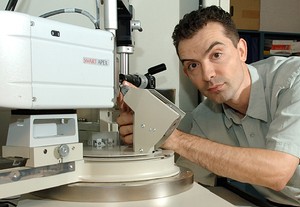Oct 13 2008
Svilen Bobev, assistant professor of chemistry and biochemistry at the University of Delaware, has been selected to receive the 2009 Margaret C. Etter Early Career Award from the American Crystallographic Association (ACA). The nonprofit scientific association has more than 2,200 members in over 60 countries.
 Using an X-ray diffractometer, Svilen Bobev, UD assistant professor of chemistry and biochemistry, analyzes the structure of a crystal in the laboratory. University of Delaware/Kathy F. Atkinson
Using an X-ray diffractometer, Svilen Bobev, UD assistant professor of chemistry and biochemistry, analyzes the structure of a crystal in the laboratory. University of Delaware/Kathy F. Atkinson
Established by ACA in 2002 in memory of Etter (1943-1992), a Delaware native and UD alumna who was a major contributor to the field of organic solid-state chemistry, the award is presented annually to recognize outstanding achievement and exceptional potential in crystallographic research demonstrated by a scientist at an early stage in his or her career. Scientists from academia, industry and government laboratories are eligible to receive the award.
Bobev will receive the award, which includes $1,000 and a plaque, and present the keynote lecture at a symposium in his honor at ACA's annual meeting next July in Toronto.
Crystallography is the study of the fundamental structure of matter at the atomic or near-atomic level--the arrangement of atoms and molecules and the forces that both control these tiny building blocks and result from them.
Bobev is exploring the synthesis, structure and properties of novel compounds formed from the rare earth metals and selected semi-metals, including silicon, germanium and tin.
The rare earth metals, which include the lanthanide series on the periodic table, have numerous scientific and industrial applications as catalysts, lasers and high-performance magnets in bearings, switches and motors. Yet little is known about the basic principles that make these magnetic and superconducting materials work, according to Bobev.
“Systematically analyzing the fundamental characteristics of these compounds will give us new insight into the principles governing their structures and properties,” Bobev says. “If we know where each atom is, we can better understand the relationships between them, their electron and spin interactions, and how to make certain properties stronger or weaker for specific applications.”
Earlier this year, Bobev received a highly competitive National Science Foundation Faculty Early Career Development Award. The five-year, $530,000 funding award is supporting the development and chemical analysis of the synthetic compounds and their properties using powder and single-crystal X-ray diffraction, scanning electron diffraction and magnetometry. A portion of the experiments will be conducted at the U.S. Department of Energy's Los Alamos and Argonne National Laboratories.
Bobev's research group at UD includes one postdoctoral fellow, two graduate students and a substantial number of undergraduate researchers. Since the highly productive group was formed in 2004, they have published 53 journal articles.
A native of Bulgaria, Bobev received his master's degree in physical chemistry from the University of Sofia and his doctorate in inorganic/solid-state chemistry from the University of Notre Dame. He was a Director's Award Postdoctoral Fellow at the Los Alamos National Laboratory before joining the UD faculty in September 2004.
Margaret C. Etter, after whom the award is named, was a professor of chemistry at the University of Minnesota. Born in Wilmington, Del., she received her master's degree in chemistry from the University of Delaware. She also had significant experience in industry as a research chemist at the 3M Company.
Etter's work emphasized the use of hydrogen bonds and co-crystals. In addition to a large body of experimental work, she was the major force in devising a set of rules known as graph sets to describe hydrogen bonds in a way that revealed similarities between structures without being tied up in the crystallographic details.
Her academic and research experience gave her a broad perspective from which to mentor students and to support and encourage colleagues.
“She had a love for people, for science, and especially for people who do science, that we honor,” the association said.